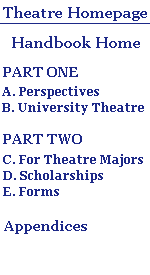|
| The Basics of Copyright ©
• What copyright is A copyright is a protection under Title 17 of the U.S. Code offered to the authors of literary, dramatic, musical, artistic,, and other intellectual properties, whether published or unpublished. A copyright protects the particular manner in which a work’s contents and ideas are expressed. You cannot copyright ideas, facts, titles, short phrases, slogans, or names, among other things.
The productions of University Theatre are distinctive in the manner in which both the scripted material is interpreted and the production is conceived and designed. The production process creates a new artistic entity, even though usually based on another copyrighted work. We can, therefore, among other things, limit and control the use of film, video, and sound recording of our original work, through a claim of copyright.
• Trademarks Trademarks and unfair competition laws allow you to protect words, names, short phrases, symbols, and other devices that identify and distinguish goods or services. Poster graphics, for example, are protected by trademark, not copyright.
• What copyright does A copyright gives the author limited exclusive rights to reproduce the work, create derivative works based on the original, distribute copies of the work, and perform or display the work in public.
Because most performance agreements grant us only the live production rights of copyrighted materials, we cannot distribute or disseminate video copies of our productions, even to close relatives. Our production archive tapes are for closely controlled classroom purposes only, and then only to demonstrate our unique creation.
• Work for hire The author usually owns the copyright automatically, unless he or she prepared the work as a work for hire, in which case the artist’s employer presumably owns the copyright. The authors of a collaborative work own its copyright jointly.
Thus, the University Players’ original scripts are the property of SPU.
• Fair use The fair use doctrine allows for copying, without permission, for such purposes as criticism, commentary, news reporting, teaching, scholarship, and research. There are four main factors that determine fair use: (1) the purpose of the use (whether copying is intended for commercial or non profit purposes); (2) the nature of the original (whether it was published or unpublished is one consideration here); (3) the amount and importance of the portion used in relation to the original work as a whole; and (4) the impact of the use on the original work’s commercial value.
Copying brief excerpts of a published script for non-profit or educational purposes seems acceptable. Wholesale copying of entire published scripts for production purposes impacts the original work’s commercial value. Copying of a purchased script may be acceptable for purposes of enlargement of format (in the case of prompt-books) or if a significant number of scripts have been purchased and time dictates immediate need. Copies of scripts should be destroyed after use.
• Copyright duration Copyrights are not eternal. When a copyright expires, the work falls into the public domain, and anyone is free to use it without permission. Any work created on or after January 1, 1978, is automatically protected by copyright from the moment it was created. For these works, the copyright expires 50 years after the author’s death. Works created before but not published or registered until after January 1, 1978, receive the same protection as works created on or after that date. Works created and published or registered before January 1, 1978, and that were still under copyright protection on that date, are now copyrighted for a total of 75 years from the date they were created, published, or registered.
Translations of plays are copyrighted separately. Cuttings or reworkings of public domain plays are copyrightable. Significant artistic interpretation of a play is copyrightable as a separate artistic creation.
To register a work, you must fill out an application form, pay $20 per application, and send one or more copies of the work to the copyright office. For more information, contact The Copyright Office, Information and Publication Section LM-455, Library of Congress, Washington. D.C. 20559.
© 1996 Whoever wants to claim it. Return to Main Appendices Page |
||||||
|
|||||||


